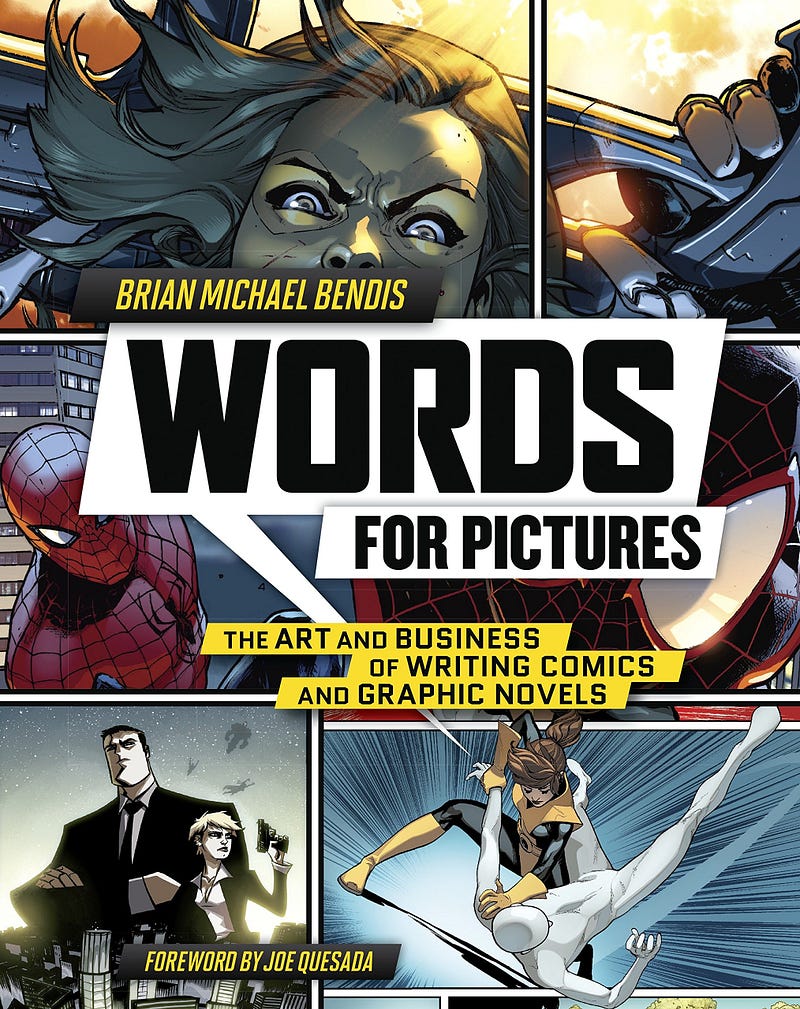As writers we often find ourselves working in one specific genre — fiction, pop-fiction, poetry, etc. For some writers, this might be fine. But if you are serious about improving your craft, you should be seeking work beyond your norm.
One of my most pleasant recent surprises was encountering a book on the process of writing comics and graphic novels called Words for Pictures by Michael Bendis. Now, this is a book dedicated to the craft of writing for a genre I do not (yet) write for professionally. If I was to search out the “top 10” craft books for fiction in the world, this would not be one which arrives at the top of the list. And this illustrates the weakness of sticking within genre lines.
This book explored all the important craft and artistic elements of making a comic book or graphic novel flow.
- How to create good dialogue
- What sets tone properly and what doesn’t
- How to go from Point A (the idea) to Point Be (getting that idea onto the page) which involves writing a pitch and synopsis.
- Honesty. An honest writer is a better writer.
- How to prioritize and manage large workloads.
Sometimes there was overlap with advice that I had encountered before, yes, but that was not the point. What I gained from exploring this book was a different perspective on how to tell a unique and complex story, how to engage the reader in the characters and plot, and how to improve your ability to evoke visualizations in the reader. All of this coming from a truly unique perspective.
What captures me most about this process of writing for graphic novels and comic books is that, when doing this, you are creating for a single reader. At most, you might be writing for five or six people (if you include the artist, editor, assistant editor, colorist, inker, and letterer — which is a larger team than most comics writers would be working with out of the gate). In many circumstances, you just have one: the artist.
It is so tempting to think about what happens after you write something. Who will like it? Who will read it? Perhaps thousands of people, or millions? Will it become a hit? But this line of thinking only detracts from what really matters: the work in itself.
When you are writing for a single person, however, you are no longer trying to please everyone. Instead you are using every tool at your disposal to evoke a particular collection of thoughts, emotions, and images in one person. Just one, solitary person. If you look at your writing in this way, you gain a level of agency over your work which many writers lose in the face of the desires of the crowd. This happens a lot on Medium and similar online article sites, too, because everyone wants to get their pieces read and have that monetary influx.
What you’ll notice, if you take a look at my Medium profile, is that I write all over the place. My goal is to produce work that I love, not work that I think other people will love; work I am invested in for the sake of my interest in the material, not for the sake of an eventual payoff. And this brings me to my final point.
Reading and writing beyond your usual genre can help you understand, to become aware of, your motivations.
Why are you writing? And keep in mind that there’s nothing wrong with producing work just to try and get food on the table. There’s a cultural myth floating around that the starving artist, or the depressed artist, create “better” work. That’s baloney. I produce my best work when I’m happy, loved, and well-fed. It’s okay to want those things.
But, at the same time, you may be pigeon-holing yourself and limiting your creative growth if all you do is create work for a specific purpose (especially a financial one). Jumping to an unfamiliar genre will certainly give you craft tools and inspiration that allow you improve all of your writing, but doing this could also help you realize a new way of expressing yourself as an artist in the world. Perhaps you have poetry inside you waiting to be unlocked, or maybe you only write poetry but your experiences in life are exactly what the world of literary fiction needs.
Reading Words for Pictures gave me insights into the craft of constructing a narrative that I needed — that I know I needed because the reading of this book inspired me to see scenes I’ve already written in new and complex ways. Words for Pictures also gave me something I didn’t know I needed: the twin realizations that I am good at writing for comic books and that I find it to be fun. I I hadn’t jumped genre I never would have known.
So, for all of you undecideds out there, pick up some reading material that’s beyond your comfort range. Pick a writing exercise that challenges you beyond your normal range. Do this and you may be amazed by the priceless things you find.

